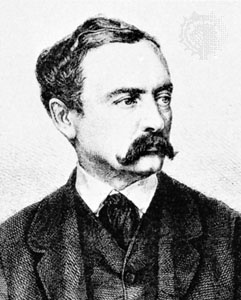Hohenlohe-Schillingsfürst, Chlodwig Karl Viktor, Fürst zu
German chancellor
born March 31, 1819, Rotenburg an der Fulda, Hesse-Nassau
died July 6, 1901, Bad Ragaz, Sankt Gallen, Switz.
 imperial German chancellor and Prussian prime minister from October 1894 to October 1900, the “Uncle Chlodwig” whose fatherly relationship with the emperor William II did not enable him to prevent his sovereign's demagogic excesses.
imperial German chancellor and Prussian prime minister from October 1894 to October 1900, the “Uncle Chlodwig” whose fatherly relationship with the emperor William II did not enable him to prevent his sovereign's demagogic excesses.A Bavarian Roman Catholic, he was a member of a princely house and bore the titles of Fürst zu Hohenlohe-Schillingsfürst and Prinz von Ratibor und Corvey. He was briefly with the Prussian civil service, then a member of the Bavarian upper house, and in 1848 he served as a diplomat in the provisional German government in Frankfurt.
In December 1866, after Prussia's defeat of Bavaria (an ally of Austria) in the Seven Weeks' War, he became minister president of Bavaria on the composer Richard Wagner's recommendation. His support of the alliances with the North German Confederation and of renewing the Zollverein, or German customs union, aroused the opposition of Bavarian nationalists, causing his fall from power in March 1870.
Hohenlohe, who in 1871 had encouraged Bavaria's entry into the German Reich, served as vice president of the Reichstag and as Bavarian representative in the Bundesrat (federal council). During the Kulturkampf (the conflict between the new German state and the Roman Catholic Church), he introduced a law against the use of the pulpit as a political platform and supported the expulsion of the Jesuit order from the empire.
His amiable skepticism, tact, and wide experience made Hohenlohe appear to be the providential candidate to fill the void left by the dismissal of Chancellor Leo, Graf von Caprivi, in 1894. As the new chancellor, Hohenlohe found himself overshadowed by more forceful personages: Johannes von Miquel, Adm. Alfred von Tirpitz, Adolf Marschall von Bieberstein, and Bernhard von Bülow. He worked, without much success, to prevent or repair the damage done by William II's enthusiasms. Although he disagreed with William's intention to deal harshly with the Social Democrats, he supported passage of the German law against subversion (1894) and the Prussian law against the Socialists (1897).
Hohenlohe's influence virtually ended in 1897, when Bülow became foreign secretary and began to direct a new “world policy” of increasing German prominence in international affairs. When Hohenlohe resigned at the age of 81, he was replaced by Bülow.
- Greyhound Lines, Inc.
- Grey, Lady Jane
- greylag
- Greylock, Mount
- Greymouth
- Grey's Anatomy
- Grey, Sir Edward, 3rd Baronet
- Grey, Sir George
- Grey, Zane
- gribble
- Gribeauval, Jean-Baptiste Vaquette de
- Griboyedov, Aleksandr Sergeyevich
- grid
- gridiron football
- Grieg, Edvard
- Grieg, Nordahl
- Grier, Robert C
- Grierson, John
- Grierson, Sir George Abraham
- Griesbach, Johann Jakob
- Griffenfeld, Peder Schumacher, Count af
- Griffes, Charles
- Griffey, Ken, Jr.
- griffin
- Griffin, Donald Redfield